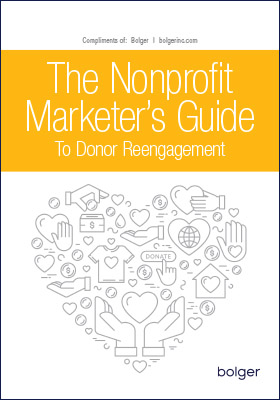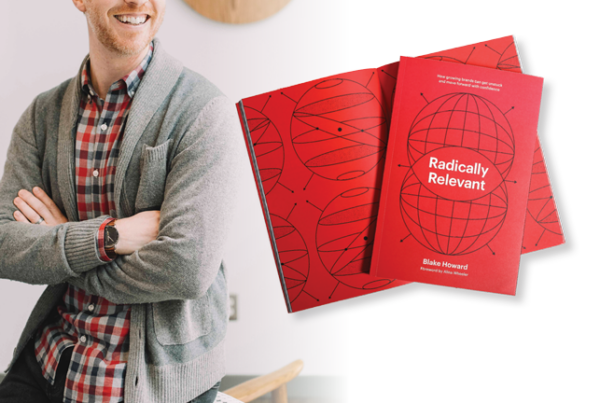“Whether you want to give the next big Ted Talk, speak more persuasively at work meetings, or feel less frightened when presenting to colleagues, the art of public speaking is a career necessity for marketing professionals. The good news: with practice, anyone can become great.
Of all the talents bestowed upon men, none is so precious as the gift of oratory,” Sir Winston Churchill once said. “He who enjoys it wields a power more durable than that of a great king. He is an independent force in the world. ”Today, more than 80 years after Churchill’s World War II radio addresses and famous House of Commons speech rallied a nation, the ability to speak and present with charisma is as valuable as ever. As a marketing professional, you likely won’t need to offer your “blood, toils, tears and sweat” like Sir Winston, but even in an increasingly digital world, the ability to personally connect with people continues to be an important skill in business (and life).“Interviews, presentations, meetings, conferences, teamwork—you will always have the advantage if you’re better at communicating,” says Gregg Fasbinder, President of Moxie Institute, a company that uses performing arts skills and neuroscience to train professionals worldwide to become better presenters. Fasbinder, who runs Moxie with his wife, Fia Fasbinder, the company’s Founder and CEO, cautions marketing and sales professionals not to be fooled by the comfort of online meetings and LinkedIn sales calls that became trendy during COVID. Those digital tools may have led to fewer physical face-to-face conversations and allowed presenters to rely on hidden crutches such as scripts and teleprompters, but Fia Fasbinder says you will always perform better if you have in-person presentation skills. “If someone is an engaging and charismatic speaker, they will be well received through any medium,” Fasbinder stresses. “People connect with people.
That’s why you still hear that word of mouth is the best advertising. The trust and rapport that two people have take years for a company to build from a distance. When a public speaker is delivering at the top of their game, everyone in the audience that is dialing in feels like they’re being spoken to individually. They don’t feel spoken at; they feel spoken to. They’re hitting all the hot buttons that ads struggle to hit—persuasion, conviction, authenticity, and even vulnerability and relatability.” Modern marketing tools such as content, email newsletters, and social media are designed to help brands reach larger audiences with less heavy lifting. But while these generic tools can be personalized by using data points and then adding a customer’s name, companies are still seeking employees who can both do the behind-the-scenes work and stand in front of a crowd and represent the brand.
“Companies don’t want to have Robert or Rachel write content and then have Sam or Sarah present it,” Fasbinder says. “They want people that are competent in and out of the public eye, on and off camera, on and off the stage. If a company decides that it wants to ‘put itself out there,’ then anyone involved needs to have exceptional communication skills. Authenticity is the currency of successful content creation, and those who can’t express themselves will fail to connect with others.”
Beyond just making you a better candidate for that brand job you covet, sharpening your speaking skills helps to build self-confidence, which improves creativity. Fasbinder points out that it takes courage to be vulnerable in front of strangers, and those who believe in themselves are more likely to try new things, innovate, take risks, and advocate for themselves and their ideas.
“Person-to-person communication and presenting take you places that go beyond business,” she says. “Influencing is a very real thing outside of social media. It makes the difference between getting a job or a key promotion and waiting around for 10 years to get noticed. It’s what gets your ideas taken seriously in the workplace. You’ve got a good idea? Great. Now you have to sell it. Daily communication is selling.”
Unfortunately, what many professionals don’t understand is that every incredible speaker they’ve ever seen did the work to improve—and they can be just as good. Moxie Institute’s work is predicated on the belief that anyone can become a great speaker and presenter. Yes, even those with a perceived “fear” of public speaking, which Fasbinder says is actually many fears banded together.
“It’s fear of being judged, fear of being disliked, fear of disappointing your superiors, or fear of being laughed at,” Fasbinder says. “We talk about it like it’s just one solitary fear, but it actually has a lot of moving parts. If someone says they’re afraid of public speaking, the real question to help them understand themselves better is: ‘What specifically are you afraid of?’”
To keep your fears under wraps, Fasbinder recommends a physical technique called diaphragmatic breathing, which physically slows your heart rate and relaxes your body so you feel less anxious and fearful. (See the sidebar for more on diaphragmatic breathing.)
If you are one of those people who became anxious simply by reading the title of this article, it may be comforting to know that those who seem at ease in front of a crowd or a camera were just like you at some point. Nurture likely played a role in how that “gifted” speaker looks onstage and how you feel in the pit of your stomach. A child who shows promise in some skill area—such as speaking—often receives support and encouragement to pursue it. If, however, a child seems bad or average at something, that skill is not encouraged in favor of one in which he or she shows promise. But Fasbinder says that if you take a child who is “good” at speaking and a child who is “bad” at speaking and give both of them lessons, support, and encouragement, both can become great speakers.
“As adults, we see others who seem to find it easier than us,” Fasbinder says. “But we don’t realize that in all likelihood they simply just had more encouragement and support than we did growing up. They don’t find it easier because of any special talent. They literally have just practiced it more than you.”
Public speaking was even a chore for Churchill in his early political days. After once freezing for three minutes while speaking as a representative in the government, he dedicated himself to improving and spent years refining his diction and delivery.

Contrary to what you may have heard, memorizing your speech is a surefire way to sabotage your efforts. Or, as Fasbinder says, “Memorization is the death ofauthenticity.”
The trick is to memorize your key point, then speak how you feel in the moment and leave space for your personality to shine through so that you deliver the human element that people are attracted to. “Scripts are for actors,” Fasbinder says. “We always teach that it’s critical you know your key points—the stuff that has to be said or communicated—but everything else can be freestyle.”
”Or, as Fasbinder says, “Memorization is the death of authenticity.”
Another way to help yourself speak in a more conversational manner is to limit the words on any supporting slides, even if all your ideas feel important. Instead, boil it down to four or five well-developed points that the audience will actually remember. If a slide has 200 words on it, explain the gist of it to someone in one sentence, then make that sentence your entire slide. “The main point is the headline,” Fasbinder says. “And the key data should be a large graphic. That’s it!”
Even if you never stand onstage at your company’s annual sales meeting, there is still great value in sharpening your verbal communication skills. For one person, it might be the key that unlocks their voice within their organization. For another, it’s a ticket to feeling more comfortable navigating those sometimes-awkward cocktail hours at an industry conference.
If you struggle to get your ideas heard inside your company, Fasbinder offers two communication tactics to change that: get people feeling and get people thinking.
“Emotion is a powerful driver for decisions. People can make decisions without thinking, but they never make a decision without feeling,” she says. “Their feelings are easier to access if you make that personal connection with them. They’re a person, not an obstacle, and you want them to see you the same way. If they feel seen and they’ve started caring about you as a person, it’ll be harder for them to disagree with you.”
Getting people thinking can be as simple as turning statements into questions. Our brains automatically answer questions, so pose yours in such a way that the person you are trying to persuade comes up with the answers that help make your case. Fasbinder explains it this way: “Instead of saying, ‘The break room needs a refrigerated watercooler,’ you might ask, ‘What would a refrigerated watercooler do for morale between meetings?’”
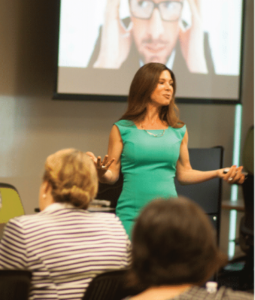
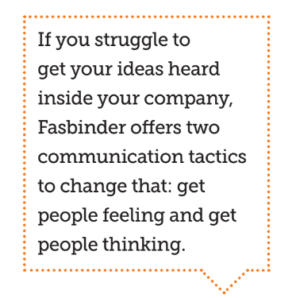
If the thought of networking in lobbies or ballrooms at industry events sends you to your hotel room cowering under the covers, it might be that you’re simply taking the wrong mindset into these opportunities. Taking a networking approach creates an awkward, uncomfortable environment, and others will pick up on your “salesy” vibe. Start by being confident in who you are and be yourself, which is what leads to real human connection. “The fact is, people, including you, want to work with and do business with people they like,” Gregg Fasbinder says. “So go there with the mindset of just making friends. It takes the pressure off; you’ll have more fun and likely come away with more unexpected connections.”
You might even go to the event with a stock of relatable stories about your clients or colleagues stashed away in your mind, using them when they are relevant to the conversation as a way to give a pitch without your listeners knowing. “The story will get people invested, and the backdrop of your business may get them curious,” he says.
Whether you’re talking to one person or one million, understanding your audience is crucial to delivering a message that can be quickly digested. Do your research up front so that you can be sure you’re saying something of value to your audience, whose time is precious. “If you go in knowing you’re enriching your audience’s life, that kind of excitement leads to passion, which leads to engagement,” Fasbinder says.
Regardless of the situation, take comfort in the fact that every speaker takes some level of fear to the stage. Good speakers just know how to keep it in check or “fool” it into being part of the show. Fia Fasbinder firmly believes that an average speaker who can manage their fear will perform better than a very capable speaker who is squashed by stage fright in front of a crowd.
“Public speaking is a skill, and it can be learned, so leave that ‘natural gift’ myth in the ground,” Fasbinder says. “Show me a ‘natural’ public speaker and I’ll show you someone that knows how to diminish or disguise any fear they’re experiencing.”
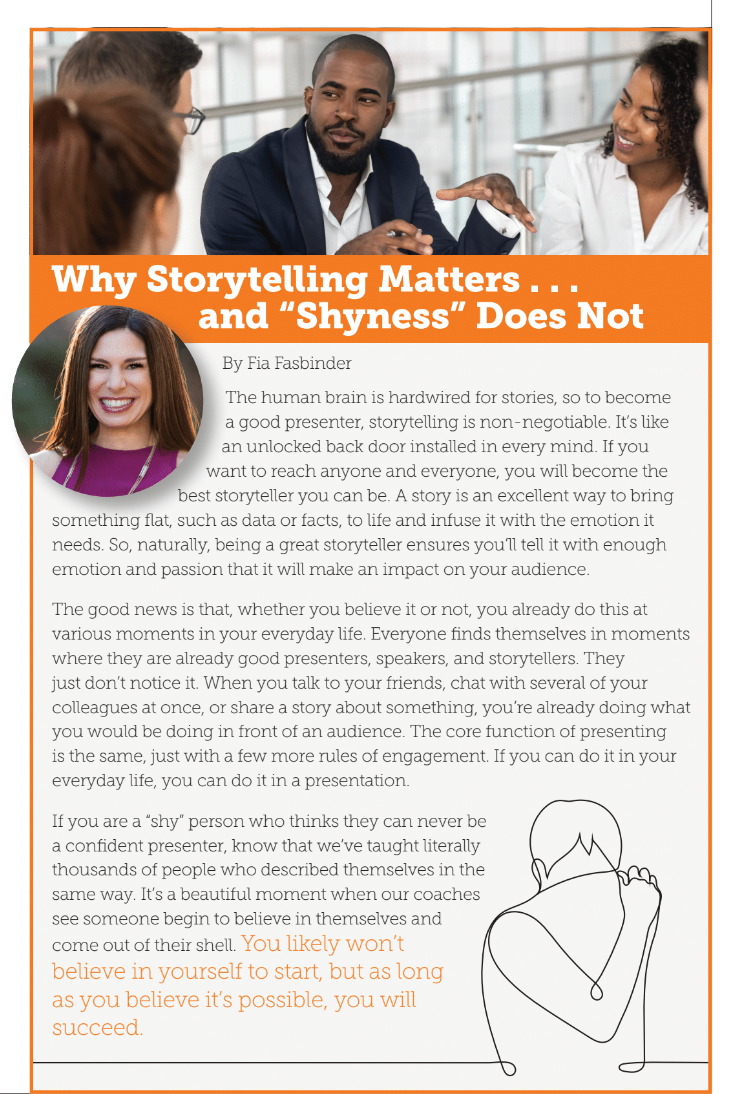
Want a helpful marketing guide?
Our helpful marketing guide will be mailed to you for FREE.
Get a Free Marketing Guide